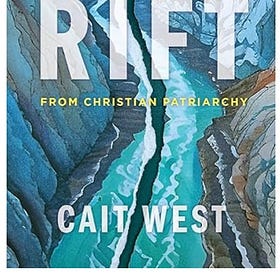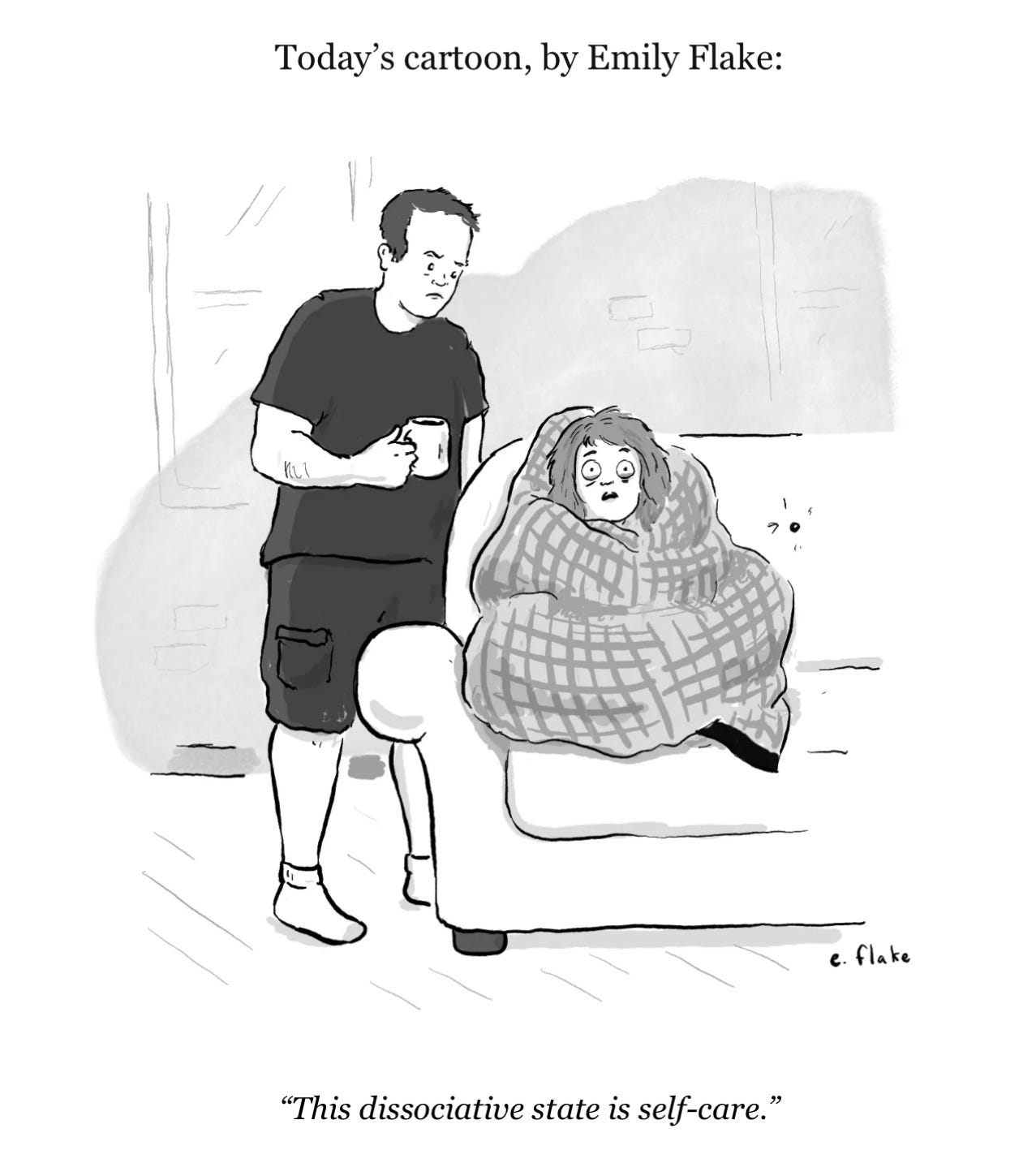
Hello friends!
The Catholic Church’s “synod on synodality”—summit on the future of the church—ended without allowing women to be deacons. (Pope Francis on CBS’s 60 Minutes in May: “Women are of great service as women, not as ministers”). Halloween is just behind us. The US presidential election is just in front of us. And I’ve been experiencing persistent, chronic anxiety.1 Worry about malignant narcissism. Authoritarian patriarchy. Fascism. Stuff like that.
As it happens, lots of people I’m connected to are thinking about the same things. (Not all—many people I know are 180 degrees from me.) A subgroup of my like-minded people are considering the influence of authoritarian religion on the current political landscape. This helps me in the ‘you are not alone’ way.
Here are some of this week’s reminders that we are not alone in our thoughts.
This week’s must read, must watch
This week
, a woman who escaped the ‘stay-at-home daughter movement’ in 2013, pointed out that since she was finally allowed to vote, every presidential election has had Donald Trump in it as a candidate. How strange that must be, to have only had that experience.West wrote a memoir (Rift) about her experience in Christian patriarchy. I recently discussed that book here on Be a Cactus. It’s very good.
West was interviewed for a short film, For Our Daughters. It makes the connection between Christian patriarchy and fascist tendencies. It’s free to watch, takes about a half-hour, and is well worth your while.
Tia Levings also wrote about her experience in authoritarian Christianity in her memoir A Well-trained Wife. I discussed that here as well. I also read Lyz Lenz’s An American Ex-wife and thought I’d reviewed it but ¯\_(ツ)_/¯ . I can’t find those words. However, I do see a few lines I wrote: “I was cheering her all the way. She’s right to have left over the lack of balance in her marriage.” All three of these books resonated with me:
Here’s
this week looking at literature that confronts malignant narcissism. He sees a pretty straight line between the personality of Henry VIII and Donald Trump.The parallels between Henry VIII and Trump are all too clear, though there are, of course, some important differences. The nature and scale of Henry's power allowed him to rid himself of his enemies through execution—or judicial murder. Trump was not able to do this, though his recent remarks about General Milley deserving execution for his criticism of the former president show us that he longs for this kind of power. His indifference to the murder by Saudi agents of journalist Jamal Khashoggi during his presidency demonstrates that he thinks that those who speak truth to power simply get what's coming to them if they are murdered.
I’ve previously mentioned the Substack
, about Religious Authoritative Parenting, with its criticism of James Dobson and Focus on the Family at its center. They posted “Focus on the Fascist Family” this week in which they draw a straight line between RAP and fascist tendencies. They discuss corporal punishment and its fallout.2 Part of that fallout is that kids who’ve had their will smacked out of them have no boundaries (Hello, that’s me!)—can’t say no to a predator because adult hands on their bodies is their normal situation. More fallout of RAP is needing a strong ‘daddy’ leader even into adulthood. (I don’t suppose you missed Tucker Carlson’s weird and sexualized anecdote about Trump as the spanking daddy, coming home to dole out discipline to a misbehaving girl. It fits right in with this whole RAP model.)The post also mentions Alice Miller’s work on the effects of corporal punishment. My husband has her book For Your Own Good: Hidden Cruelty in Childhood and the Roots of Violence, one of only a handful he kept from his counseling psychology program. I looked for it, but it’s probably buried under a hundred other books. I should give it a read. Maybe it will help me understand my own way of walking through the world. Here’s Strongwilled making the connection between RAP and fascism.
It would come to no surprise to students of history like Alice Miller to hear the crowd cheering wildly as Tucker Carlson ranted about the punishment of an allegedly delinquent society. She would see it as the most likely outcome of a society predicated on the abuse of children in order to get them to comply in patriarchal and hierarchical families. Because a society that prioritizes breaking the wills of children instead of nurturing safety, is a society that is creating citizens who are easy to control.
And here’s one more someone shared with me this week—a pastor (apparently a Nazarene) telling the congregation that Christian Nationalism is fascism.
Who’s afraid of the big, bad wolf? Billionaires.
This week my friends and I were also wondering what to do about our subscriptions to the Washington Post and the Los Angeles Times after the billionaire owners pulled editorial endorsements of Kamala Harris for president. Ultimately, I kept both subscriptions, thinking about the journalists themselves. I do wonder why billionaires cower before the possibility of Trump’s disfavor. Yes, if elected, he can mess with their government contracts (I remember the JEDI scandal). But when someone has billions of dollars, how much can that hurt? These are exactly the few people in the world who can take a stand without it causing them any real damage.
Somehow, last year, I was getting a lot of ads for Trump-themed products. I’m not sure how I got on the list, but I think of them now. Isn’t this the way a billionaire would see Trump? Just like this elf on the shelf with his hands in his lap?

Looking forward
For good or for bad, the election will finally be over next week. I’ll see how my anxiety plays out. I already have several good things lined up for Be a Cactus posts! An interview with author
about her experience with SheWrites Press. Discussions of several titles from Ali Velshi’s Banned Books Club. Some great recommended reading. Plus, we are Dodger fans—happiness there. And we picked the book cover for my upcoming novel on escape from a polygamist cult. I love it! So, friends—onward and upward!Part 2: Library and book challenge/ban news
State Senate passes bill intended to halt book bans, protect librarians from the New Jersey Monitor
A bill aimed at limiting book bans in public schools and libraries and protecting librarians from lawsuits and criminal charges is now on the [New Jersey] governor’s desk.
Titled the “Freedom to Read Act,” the legislation would require the state’s education commissioner to develop policies on how library materials are selected and how challenges to books on library shelves should be evaluated. Local school boards and library boards would then adopt their own policies using this model. …
The bill would also provide librarians and library staff with immunity from civil and criminal liability for “good faith actions.”
Researchers at Steinhardt examine the effect of book bans on public education from Washington Square News
The study — a collaboration between NYU and the University of California, San Diego — analyzed the impact of Florida’s numerous policies restricting content like books and in-class instruction by conducting interviews and surveys with 86 people, primarily teachers and parents. The team of eight researchers found a “climate of compliance, fear and stress” that threatens students’ academic performance and the well-being of both teachers and students.
It isn’t just you and I who are anxious. Check out this study on political anxiety. Here’s the summary:
Results
Large numbers of Americans reported politics takes a significant toll on a range of health markers—everything from stress, loss of sleep, or suicidal thoughts to an inability to stop thinking about politics and making intemperate social media posts. The proportion of Americans reporting these effects stayed stable or slightly increased between the spring of 2017 and the fall of 2020 prior to the presidential election. Deterioration in measures of physical health became detectably worse in the wake of the 2020 election. Those who were young, politically interested, politically engaged, or on the political left were more likely to report negative effects.
Conclusions
Politics is a pervasive and largely unavoidable source of chronic stress that exacted significant health costs for large numbers of American adults between 2017 and 2020. The 2020 election did little to alleviate those effects and quite likely exacerbated them.
Reading this reminded me of an anecdote my mom told me when I was a young adult. She’d taken my siblings and me to get vaccines, all five of us at once. None of us cried. This bothered the nurse, who said it wasn’t good to tell children not to cry when they’re hurt. She said she never did that—we just weren’t the crying type. It’s interesting how parents see the effects of corporal punishment on their kids and make no connections to how kids react to it.











Such a great article. The influence of right-wing Christianity continues, even as the society as a whole becomes more secular.
Yay Dodgers!!! 😊😊